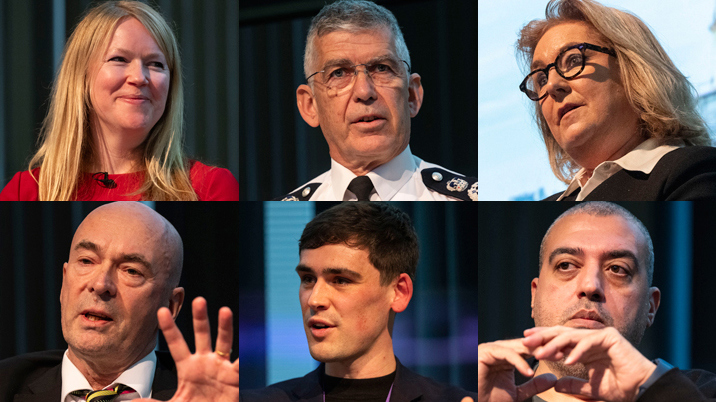
At first sight, the 25th anniversary conference of the Society of Editors was a serious case of déjà vu.
There was the obligatory appearance by the culture secretary of the day, or home secretary in old times, swearing undying affection for freedom of the press without offering too much in the way of practical help to protect such freedom.
Then, ever since the Leveson Inquiry, there have been lamentations about the rock bottom, and declining, state of relations between the media and the police.
Only just a bit less serious, there is also the never-ending battle to increase media access to the courts.
Then for the past eight years or so, there has been a regular session on the inevitable march of technology and the threat, or otherwise, to journalists’ jobs from automation and at the more fearful edge, article-writing robots.
There are always wars in the world and there has been a considerable emphasis on the safety of journalists as the death toll continues to rise, apparently inexorably, adding to the difficulty and danger of reporting on the ground.
Just as regularly, there have been attacks on the BBC, particularly the corporation’s impact online, with its free news websites making it hard for others to charge for online news. The regional press also complains about the BBC being able to outbid the regionals for top local talent.
So far, a definite case of déjà vu all over again?
Foreign ownership
Up to a point – but then not really, because although the topics may have remained the same, there is evidence of real change, and even progress.
Culture Secretary Lucy Frazer reported that following the UAE-backed bid for the Daily Telegraph group, the government was legislating to ban any foreign state owning or having a controlling influence over newspapers.
The culture secretary even brought news that she had just given permission for RedBird IMI to begin the sale of the debt it had taken on, in reality the sale of the Daily Telegraph and The Spectator.
Frazer also expressed a determination to clamp down on strategic lawsuits, or SLAPPs, whereby the rich and powerful can use their wealth through the libel courts to supress investigative journalism by facing the media with potentially crippling costs, a long-standing complaint of journalists.
In honour of the 25th anniversary conference, the first serving prime minister in the SoE’s history turned up in the flesh in the shape of Rishi Sunak.
The best the society had managed in the past was an appearance from Theresa May when home secretary.
Sunak attacked all things woke and urged journalists to continue constantly questioning, investigating and seeking the truth.
“Because as long as the British media continues to thrive, so will British democracy,” said the prime minister without suggesting how the media might continue to thrive, or be helped to thrive, a little better.
Nicola Bulley case
Police-media relations have been abysmal in recent years, not least because journalists have been lumped in with career criminals and terrorists as a category that police officers cannot deal with unaccompanied by press officers or without permission. Some press officers didn’t answer calls from the press while others bypassed crime reporters entirely by pumping out information straight to Twitter boasting they did not need to talk to crime reporters anymore.
The watershed moment when such beliefs blew up in the faces of the police came with what turned out in the end to be the “accidental drowning” of Nicola Bulley.
The Lancashire police were criticised for the lack of briefings or provision of reliable information allowing endless conspiracy theories to spread across the internet adding to the suffering of the family.
Rebecca Camber, who chairs the Crime Reporters Association, said that relations between journalists and police was one of the important relationships in journalism but in many places, it was unhealthy, fractured and that there was an urgent need to rebuild trust.
Camber has put forward no less than 26 recommendations on how relationships between police and media could be improved not least including the need for background briefings on serious crimes and even making sure that police press officers answered the phone.
Andy Marsh, chief executive of the College of Policing had already admitted that in the wake of the Bulley case, relationships between the police and media were fractured and that greater openness with the media to prevent rumours gaining traction in social media was necessary.
It was an approach that Marsh re-emphasised at the SoE conference, together with an undertaking that journalists would no longer be lumped with terrorists and criminals in rules governing meetings with police officers.
Marsh emphasised his belief in the need for greater openness and transparency, and although there is room for cynicism about how fast media-police relationships will actually improve, post Bulley, there does seem at least to be a will to change.
Open justice
Calls for more open justice have a long history at SoE conferences, something that was supported by the then chief justice, Lord Judge, speaking in 2009.
Since then, progress has been made with first, the televising of Court of Appeal proceedings and, since 2020, live streaming of sentencing comments in courts in England and Wales.
The first female lord chief justice, Baroness Carr, intends to go further and announced at the conference that she was setting up a new Transparency and Open Justice Board, chaired by Mr Justice Nicklin to ensure that journalists “have the tools to scrutinise the justice system effectively”.
The new board will set objectives for all courts and tribunals and will focus on the provision of timely and effective access for journalists to listings, documents and public hearings.
We are not likely to see the doors of courtrooms thrown open to the cameras, as in the American model, anytime soon.
Lady Carr, however, suggested that one of the steps forward could include “the careful expansion of broadcasting hearings”.
She placed heavy emphasis that the way forward would be careful and gradual.
“We will need to consider the effect that expansion may have on the parties to the proceedings and, particularly, on any adverse effect it may have on the administration of justice, public trust and confidence in the courts,” the lord chief justice warned.
Signs of progress at least and Lady Carr also noted that the new board would explore ways of making it easier for hard-pressed reporters to get online access to hearings.
She did however warn journalists that targeting judges, their private lives and families or personal criticism arising from their judgements was unacceptable when all they were doing was carrying out their judicial oaths.
Artificial intelligence
Eight years ago, at the SoE conference, Pete Clifton, editor-in-chief of PA Media, outlined modest plans to experiment with limited degrees of automation at the news agency mainly covering charts, tables and racing cards.
After the session, he was startled to see a trade press headline which read: “PA To Be Taken Over By Robots”.
At this year’s SoE conference, AI had come centre stage although robots have still not taken over the PA.
This time, Clifton explained that while humans were still firmly in charge at the PA, AI was being used increasingly for backroom tasks such as first drafts of subbing, checking spelling and compatibility with the organisation’s style guide. It is also helpful with improving access to the PA’s archive.
The aim was to free journalists from drudgery and get more reporters finding out and verifying information which they can then share, and to continue experimenting to see what worked with AI and what did not.
Jody Doherty-Cove, head of editorial AI, at Newsquest revealed that the regional group now had 12 AI-assisted reporters spread around the country to help free journalists to go out and get more front-page stories.
There was a rough consensus that, treated with care, AI would prove a useful tool for journalism as long as it is not used as an excuse to reduce staff numbers.
War correspondents
The conference heard from distinguished foreign and war correspondents against a background of record numbers of journalists killed so far this year – 94 according to the International Federation of Journalists – many of them in Gaza.
The editors were rivetted by the appearance of Rushdi Abualouf, Gaza correspondent of the BBC, now safely in London.
Abualouf told how all the journalists who had been based in Gaza City had to leave their offices in Gaza City, join the enforced move to the south and, in his case, ending up literally camping out in the courtyard of a hospital while continuing trying to cover the story.
“Suddenly everything was turned upside down. You report the story and try not to be the story. From day one, we became the story,” said Abualouf whose family inevitably shared the danger.
Can you be impartial in such circumstances, Abualouf was asked.
“The story has to be told in the right way but it’s difficult to verify and journalism is about verification,” Rushdi Abualouf replied.
One thing did not change – the relative absence of detailed discussion about the pressure on resources and the paradox that most newspaper revenues come from print sales which decline year after year and, for those who have not embraced subscription, are not being replaced by online revenues.
This led to a final single sentence outburst from Ben Lowry, editor of the Belfast News Letter, the world’s oldest English language newspaper still in publication, who said declining revenues were “a catastrophe” for newspapers, and added that the BBC was part of the problem.
And that was that for the 25th anniversary conference, except that Lowry later expanded on his comment.
The BBC could poach staff by offering journalists at least £10,000 more than papers and the BBC’s regional websites made it difficult for regional dailies to get a share of online readership.
On the revenue “catastrophe” Lowry had this to say.
“Anyone who looks at the circulation figures for daily newspapers will see that they are falling across the board at a national and regional level. While digital audiences have been rising steadily, replacing lost print revenue is nonetheless a major challenge for the industry.”
Perhaps the 26th conference of the Society of Editors will do a better job of addressing Lowry’s revenue challenge.
This article was first published in InPublishing magazine. If you would like to be added to the free mailing list to receive the magazine, please register here.












